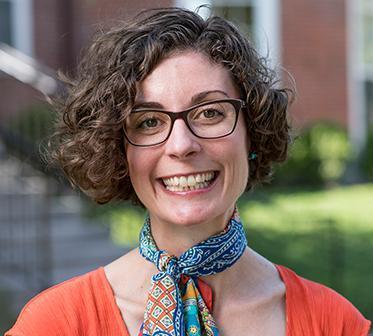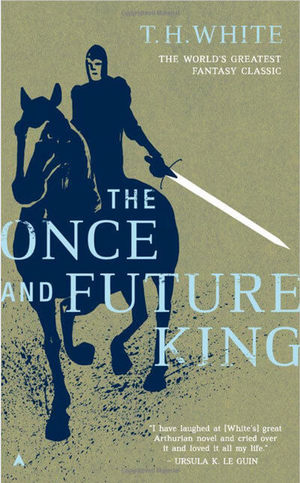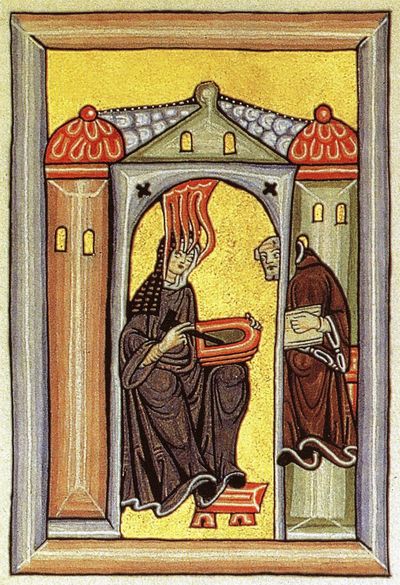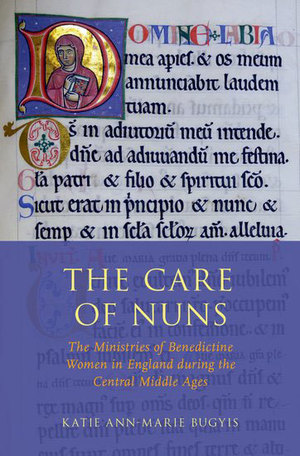Alumni Spotlight: Katie Bugyis

The Medieval Institute is pleased to present our Fall 2019 Alumni Spotlight. In this series we feature the career paths of Institute alumni. Look for a new installment each semester, and follow our weekly news features regarding Medieval Institute-supported programming, events, guest lectures and general medievalist news on our news and events page.
This semester, we're highlighting the career and insights of Katie Bugyis, who recently returned to Notre Dame as a faculty member in the Program of Liberal Studies. Bugyis is a specialist in the history of medieval religious women and liturgical practices and received her Ph.D. from the Medieval Institute in 2015 with a dissertation entitled "Ministers of Christ: Benedictine Women Religious in Central Medieval England," under the direction of esteemed scholars Margot Fassler and Kathryn Kerby-Fulton.
Bugyis has been a prolific author since her graduation, in addition to holding two prestigious fellowships at the Pontifical Institute of Mediaeval Studies and Harvard's Radcliffe Institute. She is the author of The Care of Nuns: The Ministries of Benedictine Women in England during the Central Middle Ages (Oxford University Press, 2019) as well as a number of articles and book chapters, and co-editor of two volumes, Medieval Cantors and their Craft: Music, Liturgy, and the Shaping of History, 800–1500 (York Medieval Press, 2017) and Medieval Women Intellectuals and Leaders (Boydell & Brewer, 2020). Two monographs, Liturgy Matters: Benedictine Women’s Communities in Medieval England and Hives of Prophets: Women Religious and the Figure of the Honeybee in the Middle Ages, are forthcoming.
We interviewed Katie Bugyis to learn about her experiences and insights.
When did you become interested in the Middle Ages?
I have been interested in Late Antiquity and the Middle Ages since I was a child. T. H. White's The Once and Future King was a favorite read, and I would spend all of my allowance money on books related to these two periods. I was a bit obsessed with the powers of kings and emperors, no doubt because I was the oldest of four girls and was looking for more effective ways to wield power and influence over my sisters. In all seriousness, my home life was very tumultuous throughout my childhood and adolescence, and studying the past, especially the more distant past, offered the best escape from my present and helped me to imagine a better future.

I first became interested in Medieval Studies as a discipline when I was in the spring semester of my sophomore year as an undergraduate at Notre Dame. At the time, I was a pre-med major in the College of Arts and Letters, and I had enrolled in Tom Noble's "Late Antiquity" course. When I arrived at class on the first day, I thought that I had made a big mistake, because the class was filled with seniors and graduate students in the History Department and Medieval Institute. I was enraptured by Professor Noble's opening lecture, but I still had misgivings about remaining in the course. I remember calling my mom after class, and she encouraged me to stick with it. She knew how much I loved history and suspected that this course was just the thing that I was looking for to satisfy my intellectual interests. Of course, she was right. I followed her sage advice and stayed in the course, and the rest is history.
In his comments on my first paper, Professor Noble invited me to visit him in his office in the MI (he was the director at the time). During that meeting, he encouraged me to consider majoring in history and pursuing a Ph.D. in the field. To be perfectly honest, I was stunned by his encouragement. The idea of spending the rest of my life teaching and researching the topics that I felt most passionately about had never occurred to me. No one in my family, on either my mom's or dad's side, had pursued a Ph.D. before. Fortunately, Professor Noble took me under his wing and provided the support and direction I needed throughout the rest of my time as an undergraduate at Notre Dame to pursue the course of studies he believed me capable of pursuing.
Along the way, I received further encouragement from other ND faculty members, most notably John Van Engen and Dan Hobbins, who was a post-doc at the time. It was in Professor Van Engen's "Twelfth-Century Renaissance and Reform" class that I first read the writings of Hildegard of Bingen. This encounter inspired me to study religious women and their theological writings and liturgical practices. All of these faculty had a profound influence on how I try to conduct myself as a researcher and teacher today. They were and still are the very embodiment of scholarly integrity, discipline, and generosity.
How has your work as a graduate student at Notre Dame prepared you for your career path?
When I was trying to decide where I would pursue my doctoral studies, the choice was between Yale's and Notre Dame's Medieval Studies programs. My husband, Eric, was a doctoral candidate in Yale's Religious Studies Department at the time, so accepting Yale's offer seemed like the best option for us. However, my advisor at Yale's Institute of Sacred Music, Margot Fassler, had informed me that she and her husband, Peter, had recently accepted job offers from Notre Dame and wanted me to continue studying with her there. I had learned so much from Professor Fassler during my time at Yale—the fact that she is the world's foremost scholar of Hildegard of Bingen is what led me to apply to the ISM in the first place—and I knew that if I wanted to continue developing my skills as a medievalist that I needed to follow her.
 Frontispiece of Scivias, authored by Hildegard von Bingen, who is depicted receiving a vision.
Frontispiece of Scivias, authored by Hildegard von Bingen, who is depicted receiving a vision.
Moreover, during my official visit to Notre Dame, I also had the opportunity to meet with Kathryn Kerby-Fulton, who had assumed her position at the university the year after I had graduated with my bachelor's degree. Over the course of our meeting, I learned just how much I still had to learn as a medievalist. It was both an incredibly humbling and completely exhilarating experience. I remember calling my husband, Eric, after that meeting and telling him that I had to come to Notre Dame to pursue my doctoral studies. I knew with all of my heart that the only way that I would become the kind of scholar that I aspired to be was by studying with Professors Fassler and Kerby-Fulton. I was right. They ultimately served as my co-advisors and taught me how to be a rigorous, innovative, and daring scholar. Most importantly, they have been my steadfast guides and advocates not only during my graduate studies but also after graduation. Even during the bleakest moments of the job market, they were there to cheer me on.
The research skills that I acquired as a graduate student at Notre Dame are what have advanced me to this point in my scholarly career. I would wager that there is no other program in Medieval Studies in the world that prepares its graduate students as rigorously in paleography, codicology, various ancient and modern languages (especially Latin), and historiography as Notre Dame's Medieval Institute does. My confidence in the training I received at the MI has only become stronger since graduating from the program and interacting with other scholars in the field. I know that I can do more than simply hold my own wherever I go.
How has your degree from an interdisciplinary program like that at the Medieval Institute served you differently than a discipline-specific department?
Ever since I was an undergraduate at Notre Dame, my research has always been interdisciplinary, drawing on the fields of history, literature, and theology, especially liturgy. The Medieval Institute gave me the space, support, and academic freedom I needed to continue working in these various fields. Of course, receiving a degree in Medieval Studies, rather than in History or Theology, initially posed certain challenges for me on the job market. Many search committees are looking for candidates who neatly fit into a particular disciplinary box.
[T]here is no other program in Medieval Studies in the world that prepares its graduate students as rigorously [...] as Notre Dame's Medieval Institute does. My confidence in the training I received at the MI has only become stronger since graduating from the program and interacting with other scholars in the field. I know that I can do more than simply hold my own wherever I go.
However, the fellowships at the Pontifical Institute of Mediaeval Studies and at the Radcliffe Institute for Advanced Study at Harvard University explicitly welcome interdisciplinary applicants. Funnily enough, I was one of the few fellows at Radcliffe who bore the title of "multidisciplinary" scholar. I wear this title proudly, because I know that I possess the skills and interests needed to participate competently and comfortably in conversations based in or at the nexus of a variety of disciplines, even when the topic is well outside of the Middle Ages. Finally, my interdisciplinary training prepared me to apply and be competitive for a faculty position in an interdisciplinary program like the Program of Liberal Studies at Notre Dame.
How do you feel about coming back to your alma mater as a faculty member?
I am over-the-moon excited about returning to Notre Dame as a faculty member. Truly. The faculty, students (both graduate and undergraduate), and library resources at Notre Dame are unparalleled. Since graduating from the MI in 2015, I have had a recurring dream about walking through the stacks of the seventh floor of Hesburgh Library and having all the books that I need for my research at my fingertips. I'm so excited to have returned to what has long been my academic and spiritual home. I am eager and committed to serve the university by helping students discover their intellectual gifts and passions.
What advice would you have for current grad students who would like to follow your career path?
I applied to doctoral programs in 2008, just as the economy was tanking. I can remember sitting in the terminal at O'Hare waiting for my flight back to Hartford, Connecticut, after my on-campus visit for the Ph.D. program in Medieval Studies at Notre Dame, watching Henry Paulson, then Secretary of the Treasury, discuss the financial collapse. I knew then that this new and devastating economic reality would have profound consequences for higher education, especially for students and faculty in the Humanities, and that I needed to approach my doctoral studies as an end in itself and not as a means to a necessary end, like a tenure-track job.

Now, I was very fortunate to be able to approach my doctoral studies with this mindset, because I had received a very generous graduate fellowship from Notre Dame, but as I advanced in the program, it became harder and harder to not set my heart on getting a tenure-track job after graduation, because that was what I was being trained to do. At the time, faculty were strongly advising students to try to publish as much as they could possibly publish in top-tier journals before graduating in order to make themselves more competitive on the job market. I did this, but I still had a difficult time landing a tenure-track job. There were times when I thought that it wouldn't work out for me, and that I would be forced by material circumstances to leave academia, but I continued pursuing my research because I loved what I was working on so much.
This passion—and the relentless encouragement of my husband, mother, sisters, and advisors—kept me going through some dark nights of the soul. Ultimately, everything did work out for me, but I must be perfectly honest and say that the hows and whys of it working out remain a mystery to me. Someone could point to my publications or fellowships or awards as possible reasons, but I would then show them the CV of a colleague with similar accomplishments who has not yet been able to secure a tenure-track job. The market is incredibly capricious and, thus, impossible to predict, so your time is best spent pursuing what you love.